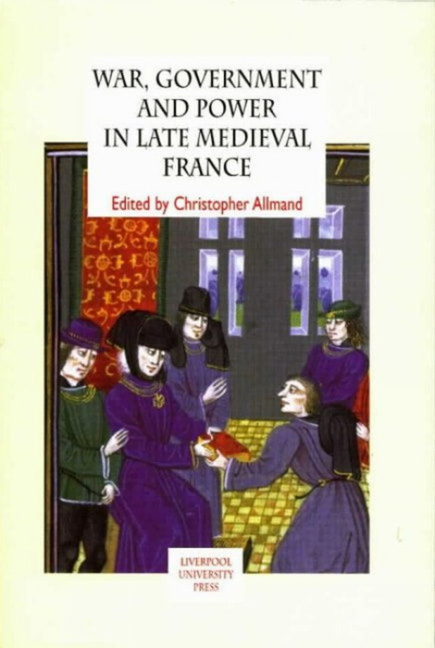Book contents
- Frontmatter
- Contents
- Dedication
- Acknowledgements
- Abbreviations
- Introduction
- 1 From the Court of Hainault to the Court of England: The Example of Jean Froissart
- 2 Froissart and his Second Book
- 3 Alain Chartier and the Arts of Crisis Management, 1417–1429
- 4 Intellectual Patterns and Affective Reactions in Defence of the Dauphin Charles, 1419–1422
- 5 War, Propaganda and Diplomacy in Fifteenth-Century France and England
- 6 History and the Literature of War: The Boke of Noblesse of William Worcester
- 7 Commynes on Kingship
- 8 ‘Centre’, ‘Power’ and ‘Periphery’ in Late Medieval French Historiography: Some Reflections
- 9 Centre and Periphery in Late Medieval France: Tournai, 1384–1477
- 10 ‘Decayed Feudalism’ and ‘Royal Clienteles’: Royal Office and Magnate Service in the Fifteenth Century
- 11 Justification and Theory of the Death Penalty at the Parlement of Paris in the Late Middle Ages
- 12 Membra disjecta of the Breton Chambre des Comptes in the Late Middle Ages: Treasures Revisited and Rediscovered
- Glossary
- Index
3 - Alain Chartier and the Arts of Crisis Management, 1417–1429
- Frontmatter
- Contents
- Dedication
- Acknowledgements
- Abbreviations
- Introduction
- 1 From the Court of Hainault to the Court of England: The Example of Jean Froissart
- 2 Froissart and his Second Book
- 3 Alain Chartier and the Arts of Crisis Management, 1417–1429
- 4 Intellectual Patterns and Affective Reactions in Defence of the Dauphin Charles, 1419–1422
- 5 War, Propaganda and Diplomacy in Fifteenth-Century France and England
- 6 History and the Literature of War: The Boke of Noblesse of William Worcester
- 7 Commynes on Kingship
- 8 ‘Centre’, ‘Power’ and ‘Periphery’ in Late Medieval French Historiography: Some Reflections
- 9 Centre and Periphery in Late Medieval France: Tournai, 1384–1477
- 10 ‘Decayed Feudalism’ and ‘Royal Clienteles’: Royal Office and Magnate Service in the Fifteenth Century
- 11 Justification and Theory of the Death Penalty at the Parlement of Paris in the Late Middle Ages
- 12 Membra disjecta of the Breton Chambre des Comptes in the Late Middle Ages: Treasures Revisited and Rediscovered
- Glossary
- Index
Summary
In the Tradition of the Orateurs
In the summer of 1422 Alain Chartier addressed an open letter to the princes, nobility, clergy and common people of France:
A la treshaulte et excellente majesté des princes, a la treshonnouree magnificence des nobles, circumspection des clers et bonne industrie du peuple françoys, Alain Charretier, humble secretaire du roy nostre sire et de mon tresredoubté seigneur, monseigneur le regent, loingtain imitateur des orateurs, salut en crainte de Dieu, humiliacion soubz sa justice, cognoissance de ses jugemens et retourner a sa misericorde soubs la pointure de sa punicion.
To the most high and excellent majesty of the princes, to the most honoured magnificence of the nobles, the circumspection of the clergy and the good industry of the people of France, Alain Chartier, humble secretary of our lord the King and of my most revered lord, my lord the Regent, and distant imitator of the Orators, greetings and prayers for salvation in the fear of God, humiliation under His justice, awareness of His judgements and a return to His mercy under the pricks of His punishment.
The opening salutation of the Quadrilogue Invectif takes a traditional form, but is greatly expanded to allow Chartier to present his credentials. He is secretary to Charles VI, le roy nostre sire, and to the regent, the dauphin, who was shortly to succeed to the throne as Charles VII. Chartier is both secretary and man of letters, schooled in the works of the orateurs whom he will imitate, however distantly. He is schooled also in religion, as his conclusion makes clear. The salutation used by the royal chancellery usually ended with salut or salut et dilection, three words at most, but here it is developed to enjoin repentance and amendment of life. Chartier, secretary and man of letters, is also a man of God, who had been appointed a canon of Notre-Dame de Paris two years earlier.
Letters of the period traditionally ended with information about when and where they were written, but this one does not, for it is interrupted. Weariness causes the author to fall asleep and to dream the dream which forms the framework of the Quadrilogue Invectif proper, a dialogue between Dame France and the three estates of the realm, Nobility, Clergy and Common People.
- Type
- Chapter
- Information
- War, Government and Power in Late Medieval France , pp. 37 - 53Publisher: Liverpool University PressPrint publication year: 2000



